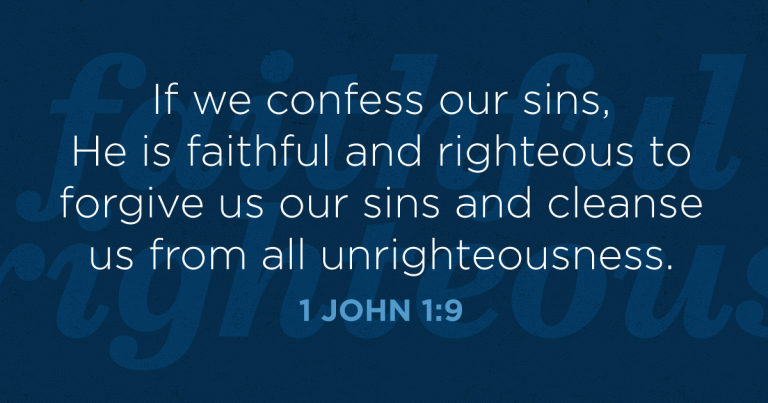What Happens If You Sin After You Are Saved
In the realm of religious beliefs, the topic of sin after salvation is a profound one, stirring discussions and contemplation among believers. Many wrestle with questions of divine forgiveness and the implications of straying from a righteous path. This article delves into the heart of this matter, shedding light on the potential ramifications of post-salvation sinning while addressing these concerns within a faith-based context.
The Concept of Salvation
Salvation, a cornerstone of various religious ideologies, embodies the notion of redemption and eternal bliss. The moment a believer experiences salvation marks a transformative juncture, aligning them with the divine and ensuring a place in the realm of spiritual fulfillment. It’s the spiritual equivalent of a second chance, a fresh start in the eyes of the divine, and an opportunity to forge a profound connection with the sacred.
However, the interplay between salvation and sin introduces complexity to this spiritual narrative. While salvation offers a promise of liberation from sin’s grip, the human propensity to err remains an ever-present reality. The question that arises is whether salvation grants immunity from future transgressions, or if a believer remains susceptible to the pull of sin even after being saved.
Post-Salvation Sin: Understanding the Dilemma
At the crossroads of faith and human nature lies the quandary of post-salvation sinning. This dilemma raises inquiries about the integrity of one’s spiritual journey, the nature of divine forgiveness, and the internal struggle against wrongful actions. Interpretations diverge, with different religious traditions offering nuanced perspectives on how to grapple with this delicate matter.
Within Christianity, some emphasize the concept of sanctification, a continual process of spiritual growth after salvation. This viewpoint acknowledges the potential for believers to stumble but encourages them to seek repentance and pursue righteousness. Similarly, in Islam, the notion of Taubah underscores the act of sincere repentance, allowing for a renewed connection with the divine despite post-salvation missteps.
The next section will delve into the repercussions of committing sins after experiencing salvation, shedding light on the spiritual, emotional, and psychological dimensions of such actions. Through this exploration, a deeper understanding of the consequences emerges, guiding believers on their ongoing journey of faith and self-discovery.
Repercussions of Sin after Salvation
The aftermath of committing sins following salvation reverberates through multiple dimensions of a believer’s life. Spiritually, a sense of disconnection from the divine may emerge, as the individual grapples with the weight of their actions. Doubts about one’s worthiness for divine grace can cast a shadow on the once-bright landscape of salvation.
Emotionally, the experience can lead to feelings of guilt, shame, and internal conflict. The internal battle between one’s spiritual aspirations and their fallible humanity can give rise to a sense of turmoil. The belief in the transformative power of salvation can become clouded, intensifying the emotional struggle.
Psychologically, the aftermath of sin can impact self-esteem and mental well-being. The perception of failing to live up to the ideals set by the divine can trigger a cycle of negative thoughts and emotions. In such instances, a person may grapple with self-forgiveness, further heightening the psychological toll of post-salvation sinning.
Navigating these intricate repercussions requires a holistic approach that embraces both spiritual teachings and psychological understanding. Seeking support from a faith community, engaging in self-reflection, and pursuing guidance from spiritual mentors can contribute to a path of healing and growth.
Biblical Perspective on Post-Salvation Sin
Delving into religious scriptures offers insight into how different faiths address the concept of sin after salvation. In Christianity, the Bible acknowledges the reality of human imperfection even after experiencing salvation. Romans 3:23 affirms, “For all have sinned and fall short of the glory of God.” This acknowledgment underscores the universality of human fallibility and the continuous need for divine grace.
The Book of 1 John 2:1 offers a beacon of hope: “My dear children, I write this to you so that you will not sin. But if anybody does sin, we have an advocate with the Father—Jesus Christ, the Righteous One.” This verse resonates with the essence of redemption and emphasizes the availability of divine intercession even after committing post-salvation sins.

In Islam, the Quranic principle of Tawba (repentance) emphasizes turning back to God in sincere remorse after straying from the righteous path. Quran 39:53 states, “Say, ‘O My servants who have transgressed against themselves [by sinning], do not despair of the mercy of Allah.'” This verse encapsulates the compassion of the divine and the invitation for believers to seek forgiveness.
The journey of faith is a dynamic and nuanced expedition, marked by growth, challenges, and the quest for spiritual elevation. While salvation sets the stage for a profound transformation, the reality of human imperfection necessitates ongoing efforts to align with divine teachings. The phenomenon of sin after salvation unveils the intricate interplay between divine mercy and human responsibility.
As believers grapple with the complexities of post-salvation sinning, a multifaceted approach emerges. Seeking forgiveness, both from the divine and oneself, is essential. Self-reflection aids in understanding the root causes of such actions, while community support offers guidance and a sense of belonging on this shared spiritual journey.
Navigating the Spiritual Journey
Guidance for individuals navigating the complexities of sin after salvation revolves around embracing a holistic approach to spirituality. Self-awareness forms the foundation of this journey. Acknowledge your humanity, recognizing that occasional missteps do not define your entire spiritual identity. Instead, they offer opportunities for growth and learning.
Repentance, a cornerstone of many faiths, holds transformative power. Embrace the act of sincere repentance as a means to mend your relationship with the divine. This involves acknowledging the wrongdoing, feeling genuine remorse, and committing to change. Understand that divine forgiveness is accessible to those who sincerely seek it.
Self-compassion plays a pivotal role. Just as the divine extends mercy, practice self-compassion when addressing your own imperfections. Treat yourself with the same kindness and understanding you would offer to others facing similar struggles.
Community engagement offers a sense of belonging and shared understanding. Connect with fellow believers who empathize with your journey and can offer insights from their experiences. Share your challenges and triumphs within a supportive environment, fostering mutual growth.
Embracing Grace and Redemption
The narrative of sin after salvation is inseparable from the concept of grace—the unmerited favor bestowed by the divine. Embrace grace as a source of solace and encouragement. Understand that your spiritual worthiness isn’t solely contingent on being free from error. Rather, it’s rooted in your commitment to growth and your willingness to seek reconciliation when you stumble.
Redemption is the heart of this journey. Embrace the idea that your past does not dictate your future. The process of redemption entails rising stronger after each fall, embodying the spirit of renewal and transformation. Each moment presents an opportunity to reconnect with the divine and reaffirm your commitment to the path of righteousness.
The intricate terrain of sin after salvation is a testament to the multifaceted nature of faith. It invites believers to embark on a dynamic journey of self-discovery, growth, and continuous renewal. While the challenge of post-salvation sinning can evoke complex emotions, it’s essential to approach this journey with compassion, self-reflection, and an unwavering belief in the transformative power of grace.
Remember that no believer is immune to the potential for missteps, yet each believer possesses the capacity for redemption. As you navigate the intricate interplay between human fallibility and divine mercy, may your journey be marked by resilience, self-compassion, and a profound sense of connection with the sacred.
In a world where perfection is unattainable, it’s your commitment to learning, growing, and seeking divine guidance that defines your spiritual voyage. Embrace the complexities, lean into grace, and continue to illuminate your path with the radiance of faith.
Frequently Asked Questions (FAQs) about Sin After Salvation
1. Can you sin after being saved?
Yes, it’s possible to sin after being saved. Salvation doesn’t make believers immune to human tendencies.
2. Does committing post-salvation sins nullify salvation?
No, salvation remains intact, but the relationship with the divine can be affected. Seek forgiveness and reconciliation.
3. Are there consequences for sinning after salvation?
Yes, there can be spiritual, emotional, and psychological consequences that arise from post-salvation sinning.
4. Does God forgive post-salvation sins?
Yes, many faiths teach that God’s forgiveness is available to those who sincerely repent, even after salvation.
5. How can I overcome guilt from post-salvation sinning?
Seek forgiveness, understand your humanity, and practice self-compassion. Engage in supportive community discussions.
6. Is repentance important after sinning post-salvation?
Yes, repentance is crucial for seeking reconciliation with the divine and moving forward in your spiritual journey.
7. Can post-salvation sinning be a test of faith?
Yes, some believe that facing challenges such as post-salvation sins tests the depth of one’s commitment to their faith.
8. How do different religions address post-salvation sins?
Various religions offer unique perspectives on this issue, emphasizing concepts like grace, repentance, and growth.
9. Can post-salvation sins lead to a spiritual crisis?
Yes, struggling with post-salvation sins can lead to doubts and challenges to one’s faith, but it can also spur growth.
10. Is it normal to experience doubts about salvation after sinning?
Yes, doubts can arise, but they can be addressed through reflection, seeking guidance, and connecting with your faith community.
11. What role does grace play in dealing with post-salvation sins?
Grace provides believers with the opportunity for redemption and renewal, even after committing sins.
12. How can I regain my sense of spiritual connection after sinning?
Practice sincere repentance, seek forgiveness, and engage in spiritual practices to rekindle your connection.
13. Can post-salvation sins lead to a stronger faith?
Yes, some individuals find that overcoming post-salvation sins deepens their understanding of their faith and reliance on divine guidance.
14. How can I avoid falling into a cycle of sin after salvation?
Stay connected to your faith community, practice self-discipline, and consistently seek divine guidance.
15. Are there examples of individuals overcoming post-salvation sins in religious texts?
Yes, religious texts often contain stories of individuals who faced challenges and sought redemption, offering inspiration.
16. What is the significance of seeking forgiveness from others after sinning?
Seeking forgiveness from others can mend relationships and demonstrate genuine remorse for your actions.
17. Can post-salvation sins teach us about humility?
Yes, experiencing post-salvation sins can remind us of our vulnerability and need for divine guidance.
18. Is it possible to grow spiritually through the process of dealing with post-salvation sins?
Absolutely, the process of grappling with post-salvation sins can lead to heightened self-awareness and personal growth.
19. How can I stay motivated to pursue righteousness after post-salvation sinning?
Focus on the transformative power of redemption and the promise of divine guidance, motivating you to strive for righteousness.
20. What’s the ultimate goal when dealing with post-salvation sins?
The goal is to foster continuous growth, strengthen your relationship with the divine, and embrace the journey of redemption.



